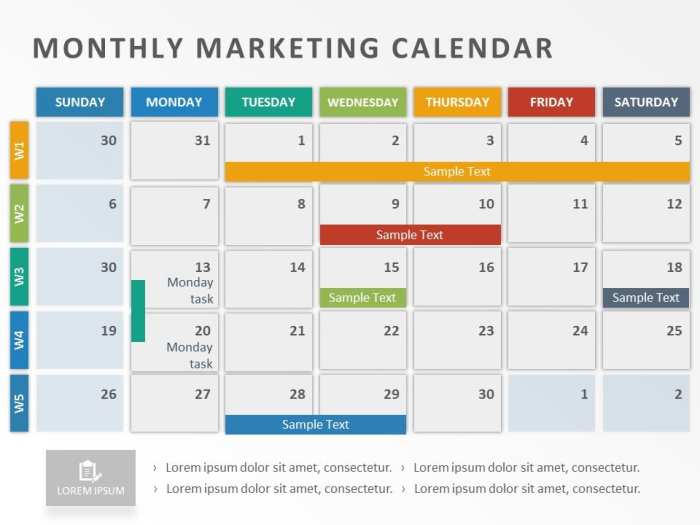Developing an Event Marketing Calendar sets the stage for seamless event planning, ensuring every marketing aspect is strategically organized and executed to perfection. Dive into the details of this essential tool that can make or break your event’s success.
From outlining key components to managing and updating the calendar, this guide will equip you with the necessary insights to create a comprehensive strategy that resonates with your target audience.
Importance of Event Marketing Calendar: Developing An Event Marketing Calendar

Having a well-developed event marketing calendar is crucial for event planning as it serves as a roadmap to guide all marketing activities leading up to the event. It helps in organizing and coordinating various marketing efforts to ensure maximum reach and impact.
Organizing Marketing Activities
An event marketing calendar helps in organizing marketing activities by providing a clear timeline for when each promotional effort should take place. It ensures that all tasks are completed on time and no important marketing activities are overlooked or forgotten.
Benefits of Using a Calendar
- Effective Planning: The calendar allows for strategic planning of marketing activities leading up to the event, ensuring a cohesive and well-coordinated approach.
- Consistency: By scheduling promotional efforts in advance, the calendar helps maintain consistency in messaging and branding across different marketing channels.
- Optimal Resource Allocation: Planning marketing activities in advance helps in allocating resources such as budget, time, and manpower efficiently to maximize results.
- Tracking Progress: With a calendar in place, it becomes easier to track the progress of marketing activities and make adjustments if needed to ensure the success of the event.
Components of an Event Marketing Calendar
Creating an effective event marketing calendar involves key components that help streamline the planning and execution process. By including essential elements and setting clear timelines and deadlines, you can ensure a successful marketing campaign that reaches your target audience effectively.
Setting Timelines and Deadlines, Developing an Event Marketing Calendar
- Establishing timelines for each phase of the event marketing process is crucial to staying organized and on track. This includes setting deadlines for tasks such as creating promotional materials, securing sponsorships, and launching social media campaigns.
- By having specific dates for when each task should be completed, you can avoid last-minute scrambling and ensure that all aspects of your marketing plan are executed smoothly.
- Setting deadlines also allows you to allocate resources effectively and prioritize tasks based on their importance and impact on the overall success of the event.
Integrating Different Marketing Channels
- Utilizing a variety of marketing channels is essential for reaching a diverse audience and maximizing exposure for your event. This includes channels such as social media, email marketing, traditional advertising, and influencer partnerships.
- When integrating different marketing channels into your event marketing calendar, it’s important to create a cohesive strategy that ensures consistent messaging and branding across all platforms.
- By planning out when and how you will utilize each marketing channel, you can create a comprehensive promotional plan that targets different audience segments and maximizes engagement.
Creating a Comprehensive Event Marketing Calendar

To create a comprehensive event marketing calendar, follow these steps:
Step 1: Set Clear Objectives
- Define the goals and objectives of your event marketing campaign.
- Establish specific targets for attendance, engagement, and ROI.
- Ensure alignment with the overall marketing strategy.
Step 2: Identify Key Events
- Research and identify key industry events, holidays, and trends relevant to your target audience.
- Determine which events align best with your brand and marketing goals.
- Select a mix of virtual and in-person events for maximum reach.
Step 3: Create a Timeline
- Map out a timeline for each event, including pre-event, during, and post-event activities.
- Allocate resources and assign responsibilities for each phase of the event marketing process.
- Set deadlines for content creation, promotion, and follow-up tasks.
Step 4: Develop Content Strategy
- Create engaging content tailored to each event, including social media posts, email campaigns, and promotional materials.
- Coordinate content creation with the event timeline to ensure timely delivery.
- Utilize a mix of visuals, videos, and infographics to capture audience attention.
Step 5: Measure and Analyze
- Implement tracking mechanisms to measure the success of each event marketing initiative.
- Analyze key metrics such as attendance, engagement, lead generation, and conversion rates.
- Use insights to optimize future event marketing strategies and improve ROI.
Managing and Updating the Event Marketing Calendar
Managing and updating the event marketing calendar is crucial to ensure the success of your marketing efforts. By staying organized and flexible, you can adapt to changes and make the most of every opportunity that comes your way.
Strategies for Managing and Updating
- Designate a calendar manager: Assign one person or a team to oversee the calendar and keep it updated regularly.
- Set reminders and deadlines: Use tools like reminders, alerts, and deadlines to stay on track with updates and adjustments.
- Regular check-ins: Schedule regular meetings or check-ins to review the calendar and make necessary changes.
Adapting to Changes
- Flexibility is key: Be prepared to adjust the calendar to accommodate changes in dates, venues, or objectives.
- Communicate changes: Make sure everyone involved is aware of any updates or modifications to the calendar to avoid confusion.
- Have a backup plan: Always have a contingency plan in place in case of unforeseen circumstances.
Significance of Regular Reviews
- Optimizing effectiveness: Regularly reviewing and adjusting the calendar helps optimize your marketing strategies and maximize results.
- Identifying trends: By reviewing the calendar regularly, you can identify trends and patterns that can inform future marketing decisions.
- Stay ahead of the game: Regular reviews and adjustments ensure that you stay ahead of the competition and remain relevant in the market.